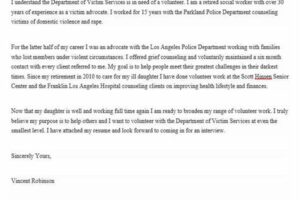Table of Contents
Are you wondering if volunteer work can be considered as valuable work experience? This article explores the benefits and drawbacks of including volunteer work on your resume, highlighting how it can demonstrate skills, dedication, and a commitment to social causes. Discover how to effectively present your volunteer experience to impress potential employers and enhance your chances of landing your dream job.
Volunteer work, often dismissed as a mere act of charity or selflessness, is frequently undervalued in terms of its potential to enhance one’s professional growth. However, it is time to challenge this common misconception and explore the question: Can volunteer work be considered work experience? In today’s competitive job market, where employers prioritize relevant skills and experiences, volunteering offers a unique opportunity to develop valuable attributes that can significantly bolster one’s career prospects. Whether it’s honing specialized skills, expanding professional networks, or gaining a deeper understanding of diverse communities, volunteering presents a wealth of advantages that should not be underestimated.
Introduction
Volunteering has always been a noble act, allowing individuals to contribute their time and skills to support various causes and organizations. Besides the intrinsic rewards that come with volunteering, many individuals also wonder if volunteer work can be considered as valuable work experience. In this article, we will explore the significance of volunteer work and whether it can be considered as relevant work experience.
The Definition of Work Experience
Work experience generally refers to the practical knowledge and skills gained through employment in a specific field or industry. It typically involves paid positions where individuals carry out tasks and responsibilities related to their profession. This may include internships, part-time jobs, or full-time employment. However, the question arises whether volunteer work can be included within the scope of work experience.
Volunteer Work: A Valuable Experience
Volunteer work, although unpaid, provides individuals with a unique opportunity to acquire valuable skills and experiences. Whether it is volunteering at a local animal shelter, working in a community garden, or providing assistance at a nursing home, these activities offer a chance to develop both hard and soft skills. The skills gained through volunteer work can enhance an individual’s employability and make them stand out in a competitive job market.
Developing Transferable Skills
Volunteer work often allows individuals to develop transferable skills that can be applied in various professional settings. These skills include communication, teamwork, problem-solving, time management, and leadership. For instance, working as a volunteer in a team environment requires effective communication and collaboration with others, which are highly valued skills in the workplace.
Industry-Specific Knowledge
Volunteering in a specific field or industry provides individuals with firsthand exposure to industry-specific knowledge and practices. For example, volunteering at a hospital can give aspiring medical professionals a chance to observe healthcare procedures, interact with patients, and gain insights into the healthcare system. This experience can be highly beneficial when seeking employment or applying for further education in the same field.
Showcasing Initiative and Dedication
When employers review resumes or interview candidates, they often value individuals who have demonstrated initiative and dedication. Volunteering showcases an individual’s commitment to a cause or organization, highlighting their passion and willingness to contribute to society. It reflects positively on their character and work ethic, making them more appealing to potential employers.
Networking Opportunities
Volunteering also provides ample opportunities for networking and expanding one’s professional contacts. By working alongside other volunteers, professionals, or even influential individuals within the organization, volunteers can establish valuable connections that may lead to future employment opportunities or professional references. These networking opportunities can be of immense value, particularly for individuals who are just starting their careers.
Volunteer Work on a Resume
When considering whether to include volunteer work on a resume, it is important to tailor the information to the specific job or industry. Including volunteer work can demonstrate relevant skills and experiences that align with the desired position. It is essential to highlight the achievements, responsibilities, and outcomes of the volunteer work, showcasing its relevance to the targeted job.
Emphasizing Transferable Skills
When discussing volunteer work during an interview or in a cover letter, it is crucial to emphasize the transferable skills gained through these experiences. Employers often appreciate candidates who have developed strong interpersonal skills, adaptability, and the ability to work in diverse environments. By highlighting these skills, individuals can effectively convey the value of their volunteer work.
Conclusion
Volunteer work can undoubtedly be considered as valuable work experience. It provides individuals with an opportunity to develop transferable skills, gain industry-specific knowledge, showcase initiative and dedication, and create networking opportunities. When included strategically on a resume or discussed thoughtfully during an interview, volunteer work can greatly enhance an individual’s chances of securing employment and advancing their career.
Can Volunteer Work Be Considered Work Experience?
Volunteer work can indeed be considered valuable work experience. While it may not be paid employment, it offers individuals the opportunity to gain practical skills and develop a strong work ethic, all while showcasing their commitment and dedication to a cause or organization. In fact, volunteer work often equips individuals with transferable skills such as communication, teamwork, problem-solving, and leadership, which are highly valued by employers across various industries.
Understanding the Value of Volunteer Work
Volunteering provides individuals with the chance to contribute to society in a meaningful way while also developing important skills. By dedicating their time and efforts to a cause or organization, volunteers gain hands-on experience that can be just as valuable as paid work experience. They learn to navigate professional environments, manage responsibilities, and meet deadlines, all of which are crucial skills in the workplace.
Transferable Skills Learned While Volunteering
One of the key benefits of volunteer work is the acquisition of transferable skills. These skills, such as communication, teamwork, problem-solving, and leadership, can be applied to various job roles and industries. Through volunteering, individuals have the opportunity to apply and enhance these skills, making them an asset in the job market. Employers often look for candidates who possess these transferable skills, as they demonstrate adaptability and a well-rounded skill set.
Demonstrating Initiative and Drive
Engaging in volunteer work demonstrates a high level of initiative and drive. It shows potential employers or educational institutions that the individual is willing to go beyond their comfort zone, take on responsibilities, and contribute to the betterment of society. This mindset can significantly enhance a candidate’s employability and personal growth. Employers value individuals who are proactive, self-motivated, and willing to take on challenges, all of which can be demonstrated through volunteer work.
Building a Solid Network
Volunteer work provides opportunities to interact with people from diverse backgrounds and professional fields. This networking allows individuals to build strong relationships, gather recommendations, and potentially open doors for future job opportunities or career advancements. The connections made through volunteering can prove to be invaluable in the job market, as they can provide individuals with insider knowledge, mentorship, and potential referrals.
Gaining Industry Insights
Volunteering in a specific industry or organization can offer invaluable insights into the work and operations of that field. This first-hand experience can provide individuals with a better understanding of their career interests and goals, allowing them to make more informed decisions about their professional paths. By immersing themselves in the industry through volunteer work, individuals can gain valuable industry-specific knowledge and skills that can be leveraged in their future careers.
Supplementing Limited Professional Experience
For individuals with limited professional experience, volunteering can bridge the gap by showcasing their ability to take on responsibilities, engage with others, and contribute to achieving organizational objectives. This experience can help bolster their résumé and increase their chances of securing paid employment. Employers often value candidates who have demonstrated a willingness to learn and contribute, regardless of whether it was in a paid or volunteer capacity.
Enhancing Personal Growth and Confidence
Volunteer work often involves taking on challenging tasks or working in unfamiliar environments, helping individuals develop resilience, adaptability, and confidence in their abilities. These personal growth experiences gained through volunteering can be highly influential and translate into improved performance in future professional roles. Volunteering allows individuals to step out of their comfort zones and develop essential soft skills that are highly sought after by employers, such as communication, problem-solving, and adaptability.
Increasing Employability and Standing Out from the Crowd
In a competitive job market, volunteer work can differentiate candidates from others with similar qualifications. Employers often value candidates who have demonstrated a willingness to contribute to society, and volunteer experience can be a strong selling point that sets individuals apart from other applicants. By showcasing their commitment, dedication, and transferable skills gained through volunteering, individuals can increase their employability and make a lasting impression on potential employers.
In conclusion, volunteer work can indeed be considered valuable work experience. It offers individuals the opportunity to gain practical skills, develop a strong work ethic, and showcase their commitment and dedication. Through volunteering, individuals acquire transferable skills, demonstrate initiative and drive, build a solid network, gain industry insights, supplement limited professional experience, enhance personal growth and confidence, and increase their employability. Therefore, volunteer work should be recognized and valued as a form of work experience that can greatly benefit individuals in their professional development.
In a professional context, volunteer work can indeed be considered as valuable work experience. Although it may not involve monetary compensation, the skills and knowledge gained through volunteering can contribute to an individual’s overall professional development. Here are several points to consider:
1. Transferable Skills:
- Volunteer work allows individuals to develop and enhance a wide range of transferable skills that are highly sought after by employers. These skills may include leadership, teamwork, communication, problem-solving, and time management.
- Engaging in volunteer activities demonstrates an individual’s willingness to contribute to society and can showcase their ability to take initiative, adapt to new environments, and work well with diverse groups of people.
2. Industry Relevance:
- Volunteering in a specific field or industry can provide firsthand exposure and practical experience related to that particular field.
- For example, volunteering at a hospital can offer insight into the healthcare industry, while volunteering at a non-profit organization focused on environmental conservation can provide valuable knowledge about sustainability and conservation efforts.
- Such industry-specific volunteer experiences can be beneficial when applying for jobs or internships within those sectors.
3. Networking Opportunities:
- Volunteer work often involves interacting with professionals from various backgrounds, including potential employers, mentors, and industry experts.
- Building connections through volunteering can lead to valuable networking opportunities, which can open doors to future employment prospects.
- Through these connections, individuals may gain access to job openings, recommendations, and even mentorship programs that can further enhance their professional growth.
4. Demonstrates Commitment:
- Including volunteer work on a resume or in an interview can showcase an individual’s commitment to giving back and making a positive impact on their community.
- Employers often appreciate candidates who are actively involved in volunteer work, as it reflects their dedication, altruism, and ability to manage multiple responsibilities.
5. Skill Development Opportunities:
- Volunteer work can provide individuals with opportunities to learn and develop new skills that may not be available in their current professional roles.
- For instance, volunteering in event planning may allow someone to gain experience in organizing and coordinating large-scale events, which can be valuable in various industries.
- These additional skills acquired through volunteering can make an individual more versatile and marketable in the job market.
Conclusion:
While volunteer work may not be compensated monetarily, it should not be underestimated in terms of its value as work experience. The transferable skills, industry relevance, networking opportunities, commitment demonstrated, and skill development opportunities gained through volunteering can significantly contribute to an individual’s professional growth and enhance their employability. Thus, including volunteer work on a resume or discussing it during interviews can positively influence an individual’s chances of securing future employment opportunities.
Thank you for taking the time to visit our blog and explore the topic of whether volunteer work can be considered as work experience. We hope this article has provided you with valuable insights and a deeper understanding of the subject. While we cannot provide you with a definitive answer, we have presented various arguments and perspectives to help you form your own opinion.
Volunteer work is often seen as an opportunity to contribute to society, make a difference, and gain personal fulfillment. However, it is important to recognize that volunteer work can also offer valuable professional experience. Many individuals underestimate the transferable skills and knowledge that can be acquired through volunteer positions, which can be highly relevant in the job market.
One of the main reasons why volunteer work should be considered as work experience is the development of transferable skills. Whether you are working in a local community center, assisting in a nonprofit organization, or participating in a charity event, you are likely to acquire and enhance skills that are applicable across various industries. These skills may include communication, teamwork, problem-solving, organization, and leadership. Additionally, volunteer work often requires individuals to adapt to new situations, work with diverse groups, and think creatively – all of which are highly valued by employers.
In conclusion, while the question of whether volunteer work can be deemed as work experience is subjective, there are convincing arguments to support its inclusion on a resume or job application. By highlighting the transferable skills and valuable experiences gained through volunteer work, individuals can effectively demonstrate their commitment, dedication, and ability to contribute to a professional setting. Ultimately, it is essential to recognize the importance of volunteer work and the potential it holds in shaping one’s career path. So, the next time you engage in volunteer work, remember that you are not only making a positive impact on society but also enriching your own professional journey.
Thank you once again for joining us on this exploration of volunteer work as work experience. We hope you found this article informative and thought-provoking. If you have any further questions or would like to share your own experiences, we encourage you to leave a comment below. Best of luck in your future endeavors!
Video Can Volunteer Work Be Considered Work Experience
People also ask about whether volunteer work can be considered work experience:
Is volunteer work considered work experience?
Yes, volunteer work can indeed be considered as valuable work experience. Although it may not involve monetary compensation, volunteering allows individuals to gain practical skills, knowledge, and professional contacts that can enhance their overall employability.
How do I include volunteer work on my resume?
When including volunteer work on your resume, treat it as you would any other job experience. Clearly state the name of the organization, your role, the dates of your involvement, and provide a brief description of your responsibilities and accomplishments. Highlight any relevant skills or experiences gained through volunteering that are applicable to the job you are applying for.
Can volunteer work substitute for formal work experience?
Volunteer work can be seen as a valuable substitute for formal work experience, especially for individuals who are just starting their careers or looking to switch industries. Employers often value volunteer work as it demonstrates initiative, dedication, and a commitment to giving back to the community. Just be sure to highlight the transferable skills and accomplishments gained during your volunteer experience.
Do employers value volunteer work?
Many employers highly value volunteer work because it showcases qualities such as teamwork, leadership, problem-solving, and adaptability. Volunteer experience can also provide insights into an individual’s character, work ethic, and values, which are important considerations for employers when evaluating candidates. Additionally, volunteering often indicates a willingness to learn and grow outside of traditional paid employment.
Should I mention volunteer work in a job interview?
Absolutely! Mentioning your volunteer work in a job interview can help you stand out and demonstrate your commitment to personal growth and community engagement. It allows you to showcase relevant skills, experiences, and values that align with the position you are applying for. Discuss how your volunteer work has contributed to your overall professional development and exemplifies qualities that make you a strong candidate.






